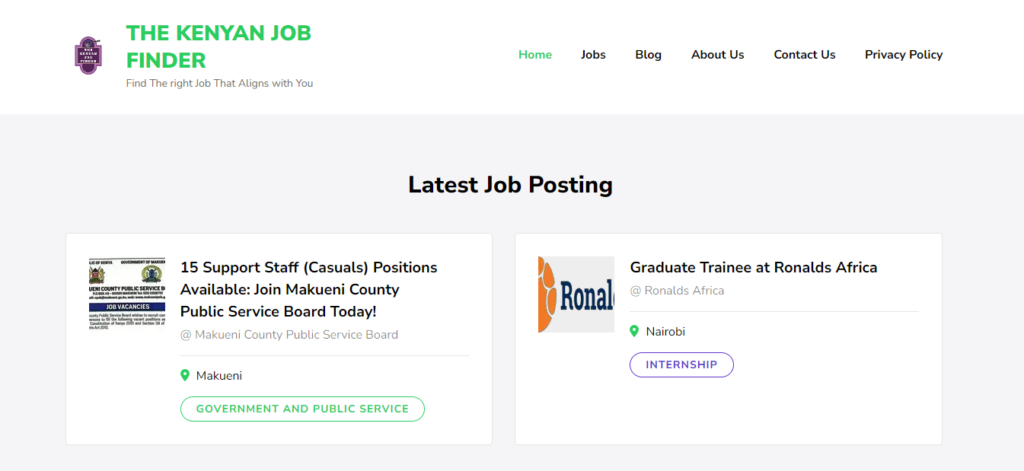Obtaining employment (How to Land Your Dream Job) in today’s highly competitive labor market can be a difficult and time-consuming endeavor. You can, however, considerably boost your chances of securing the job of your dreams by employing the specific methods and approaches that are appropriate. In order to assist you in effectively navigating the process of job searching, this thorough guide provides you with helpful insights and recommendations that you can put into action.
Gaining an Understanding of Your Professional Objectives: A Roadmap to Success – How to Land Your Dream Job

Understanding Your Career Goals
Before going heavily into the process of looking for a job, it is essential to take a step back and carefully assess the career goals you have set for yourself initially. Having a clear idea of what you want to accomplish in your professional life will not only make your job search more efficient, but it will also ensure that you seek chances that are in keeping with your goals and principles. In this section, we will go more into the relevance of establishing your career goals and the effective ways to go about achieving them.
1.Assessing Your Skills, Interests, and Values
Conducting a comprehensive self-assessment is the first step in the process of gaining a knowledge of your professional development objectives. Take some time to evaluate your abilities, both technical and soft, and pinpoint the areas in which you thrive. It is important to take into consideration your hobbies and passions; what kinds of activities or topics excite and motivate you? In addition, you should give some thought to your core beliefs and the aspects of a working environment that are most significant to you, such as the importance of autonomy, creativity, teamwork, or a feeling of purpose.
- Establishing Clearly Defined Goals
Having a deeper grasp of your abilities, interests, and beliefs is the first step in the process of establishing distinct goals for your professional life. Define what success means to you in terms of your job, whether it be obtaining a better work-life balance, moving to a leadership position, or transitioning to a different industry. Consider all of these possibilities. In order to give you with a road map that will guide your career decisions and actions, it is important to set goals that are SMART, which stands for specific, measurable, attainable, relevant, and time-bound.
- Investigating the Roles of Various Professions
When you have your goals in mind, you should investigate the many career routes that are in line with your interests and aspirations. You can obtain a better understanding of the options that are accessible by conducting research on a variety of industries, employment roles, and organizations. Think on things like the job outlook, the possibility for growth, the salary range, and the culture of the workplace. Developing professional relationships with people who work in the sector that you are interested in can also provide you with useful insights and first-hand experiences that can assist you in making well-informed decisions regarding your future path.
- Attempting to Obtain Direction and Mentorship
The process of navigating your career path can be intimidating, but you don’t have to go through it by yourself. It is advisable to seek assistance and mentorship from seasoned professionals who are able to provide guidance, support, and insights based on their own experiences in the working world. In order to connect with possible mentors who can provide valuable assistance and mentorship, you should look for mentors within your existing network or go out to industry groups, alumni networks, or professional organizations.
- Remaining Flexible and Adaptable
It is crucial to have crystal-clear career goals; but, it is also important to maintain flexibility and adaptability along with your career as it progresses. It is possible that unforeseen possibilities or obstacles will present themselves along the route due to the fact that the work market is always shifting. Maintain a mindset that is open to exploring new options, learning new skills, and taking on different positions, all of which have the potential to improve your professional chances. Accept change as an inevitable component of the path you are taking in your work and view it as a chance for personal development and advancement.
Making the Most of Your Initial Impression Through the Crafting of a Targeted Resume and Cover Letter

Your resume and cover letter are your first opportunity to make a lasting impression on potential employers. Crafting them effectively is essential to showcase your qualifications, experiences, and suitability for the job you’re applying for. Here’s a detailed breakdown of how to create a targeted resume and cover letter that will capture the attention of hiring managers:
1. Tailoring Your Resume:
- Customize for Each Application: Avoid sending out generic resumes. Tailor your resume for each job application by highlighting the most relevant skills, experiences, and achievements that align with the job requirements. This shows that you’ve taken the time to understand the position and are genuinely interested in it.
- Use Keywords: Many companies use applicant tracking systems (ATS) to screen resumes. To ensure your resume gets past the ATS and into the hands of a human recruiter, incorporate keywords from the job description into your resume. These keywords should reflect the skills, qualifications, and experiences sought by the employer.
- Highlight Achievements: Instead of simply listing job duties, focus on your achievements and quantifiable results. Use metrics and specific examples to demonstrate how you’ve contributed to previous employers’ success. This not only showcases your value but also makes your resume more compelling and memorable.
- Keep it Concise: Your resume should be concise and easy to read. Aim for a clean and professional format, use bullet points to convey information succinctly, and limit your resume to one or two pages. Be selective about the information you include, prioritizing relevant experiences and skills.
2. Crafting Your Cover Letter:
- Address the Hiring Manager: Whenever possible, address your cover letter to the hiring manager by name. If the name isn’t provided in the job posting, do some research to find out who the hiring manager is. Personalizing your cover letter shows initiative and attention to detail.
- Show Genuine Interest: Use the cover letter to express your genuine interest in the position and company. Research the company’s mission, values, and recent initiatives, and explain why you’re excited about the opportunity to contribute to their success. This demonstrates that you’ve done your homework and are motivated to join the team.
- Highlight Your Fit: Use the cover letter to connect the dots between your experiences and the job requirements. Provide specific examples of how your skills and accomplishments make you a strong fit for the role. Make sure to address any potential gaps or concerns in your resume and explain why you’re well-suited for the position.
- Conclude with a Call to Action: Close your cover letter with a strong call to action, expressing your eagerness to discuss your qualifications further in an interview. Provide your contact information and indicate your availability for a follow-up conversation. This encourages the hiring manager to take the next step and reach out to you.
Networking and Building Professional Relationships: Unlocking Opportunities

In today’s job market, networking and building professional relationships are invaluable tools for advancing your career and uncovering hidden job opportunities. Whether you’re actively seeking employment or looking to grow within your current role, fostering meaningful connections with professionals in your industry can open doors to new opportunities, insights, and collaborations.
Understanding the Importance of Networking
Networking is more than just exchanging business cards or connecting with people on social media; it’s about cultivating genuine relationships based on mutual respect and shared interests. By expanding your network, you gain access to a wealth of resources, including job leads, industry knowledge, mentorship, and support. Additionally, networking allows you to stay informed about industry trends, upcoming events, and potential career advancements.
Strategies for Effective Networking
Effective networking requires a strategic approach and consistent effort. Here are some key strategies to help you build and leverage your professional network:
- Attend Industry Events: Make an effort to attend industry conferences, seminars, workshops, and networking events. These gatherings provide valuable opportunities to meet and connect with professionals in your field, exchange ideas, and learn from industry leaders.
- Utilize Online Platforms: Leverage online platforms like LinkedIn, Twitter, and professional forums to expand your network beyond geographical boundaries. Join industry-specific groups and communities to engage in discussions, share insights, and connect with like-minded professionals.
- Build Meaningful Relationships: Focus on building genuine, long-lasting relationships with individuals in your network. Take the time to get to know them, understand their goals and interests, and find ways to offer value or support. Remember, networking is a two-way street, so be willing to give as much as you receive.
- Follow Up and Stay Connected: After meeting someone at an event or connecting online, don’t let the relationship fizzle out. Follow up with a personalized message or email to express your gratitude for the connection and express your interest in staying in touch. Regularly check in with your contacts to maintain the relationship and nurture ongoing connections.
- Offer Assistance and Support: Be proactive in offering assistance and support to your network whenever possible. Whether it’s sharing relevant articles, making introductions, or providing advice, demonstrating your willingness to help others strengthens your relationships and fosters goodwill within your network.
The Power of Referrals and Recommendations
One of the most significant benefits of networking is the potential for referrals and recommendations. When you build strong relationships with professionals in your network, they are more likely to recommend you for job opportunities, introduce you to key decision-makers, or provide testimonials of your skills and capabilities. Referrals carry significant weight in the hiring process and can give you a competitive edge over other candidates.
Utilizing Online Job Search Resources:

In the digital age, online job search resources have become invaluable tools for job seekers. These platforms offer a wide range of features and functionalities to help individuals explore job opportunities, research companies, connect with recruiters, and ultimately secure employment. Here’s a detailed look at how you can effectively utilize online job search resources to enhance your job search:
1. Explore Job Boards: Online job boards such as Indeed, Glassdoor, LinkedIn, and Monster are among the most popular resources for job seekers. These platforms aggregate job postings from various sources, including company websites, recruitment agencies, and job portals. Users can search for jobs based on keywords, location, industry, salary range, and other criteria. Additionally, many job boards offer advanced search filters and features such as job alerts, resume posting, and company reviews to streamline the job search process.
2. Research Companies: Before applying for a job, it’s essential to research the hiring company to gain insights into its culture, values, reputation, and recent developments. Many online job search platforms provide company profiles and reviews, allowing users to learn more about potential employers. Company profiles typically include information such as company size, industry, headquarters location, employee reviews, and available job openings. Utilize this information to assess whether a company aligns with your career goals and values before submitting your application.
3. Connect with Recruiters: Networking with recruiters can significantly enhance your job search efforts. Online job search platforms often feature recruiter profiles and messaging functionalities that allow job seekers to connect with recruiters directly. Reach out to recruiters who specialize in your industry or field of interest and express your interest in potential job opportunities. Building relationships with recruiters can lead to insider job leads, interview invitations, and valuable career advice.
4. Set Up Job Alerts: Job alerts are a convenient way to stay updated on new job postings that match your criteria. Most online job search platforms allow users to set up personalized job alerts based on keywords, location, industry, and job type. You can choose to receive job alerts via email, mobile notifications, or within the platform itself. By setting up job alerts, you can stay proactive in your job search and be among the first to apply for relevant job openings as soon as they become available.
5. Utilize Niche Job Boards: In addition to general job boards, consider utilizing niche job boards that cater to specific industries, professions, or demographics. Niche job boards often feature job postings that may not be found on larger job search platforms, making them valuable resources for targeted job searches. Whether you’re looking for jobs in healthcare, technology, finance, or creative industries, there are niche job boards available to suit your needs. Research and identify niche job boards relevant to your field and explore job opportunities tailored to your interests and qualifications.
6. Leverage Social Media: Social media platforms like LinkedIn, Twitter, and Facebook are powerful tools for job seekers to network, engage with industry professionals, and discover job opportunities. Create a professional LinkedIn profile highlighting your skills, experiences, and achievements, and actively participate in relevant LinkedIn groups and discussions. Follow companies of interest on Twitter and Facebook to stay updated on their latest job openings and company news. Additionally, consider reaching out to connections and recruiters via social media to expand your professional network.
Preparing for Interviews: Key Strategies for Success

Interviews are a critical step in the job search process, offering you the opportunity to showcase your qualifications, skills, and personality to potential employers. Proper preparation is essential to make a positive impression and increase your chances of securing the job. Here are some detailed strategies to help you effectively prepare for interviews:
1. Research the Company: Before the interview, take the time to research the company thoroughly. Visit their website to learn about their mission, values, products or services, company culture, and recent news or developments. Understanding the company’s background and goals will demonstrate your genuine interest and enthusiasm during the interview.
2. Understand the Job Description: Carefully review the job description to understand the specific requirements and responsibilities of the role. Identify key skills, qualifications, and experiences that the employer is seeking in an ideal candidate. Tailor your responses during the interview to highlight how your background aligns with the job requirements.
3. Practice Common Interview Questions: Prepare for common interview questions by practicing your responses in advance. Anticipate questions about your strengths, weaknesses, previous work experiences, achievements, and why you’re interested in the position. Practice articulating your answers clearly and concisely, focusing on specific examples to support your points.
4. Showcase Your Achievements: During the interview, be prepared to discuss your accomplishments and contributions in previous roles. Highlight specific projects, initiatives, or challenges you’ve successfully tackled and the results you achieved. Quantify your achievements whenever possible with metrics or statistics to provide tangible evidence of your capabilities.
5. Demonstrate Cultural Fit: Employers not only look for candidates with the right skills and qualifications but also those who will fit well within their company culture. During the interview, showcase your personality, values, and work ethic to demonstrate that you’re a good cultural fit for the organization. Be friendly, enthusiastic, and professional in your interactions with the interviewer.
6. Prepare Questions to Ask: Prepare insightful questions to ask the interviewer to demonstrate your interest in the company and the role. Inquire about the company’s future goals, team dynamics, opportunities for growth and development, and expectations for the position. Asking thoughtful questions will also help you gather valuable information to assess whether the company is the right fit for you.
7. Dress Appropriately: Dress professionally and appropriately for the interview, taking into account the company’s dress code and industry norms. Choose attire that reflects your professionalism and makes you feel confident and comfortable. Pay attention to grooming and personal hygiene to ensure a polished appearance.
8. Arrive Early and Be Prepared: Plan to arrive at the interview location early to allow for unexpected delays and to familiarize yourself with the surroundings. Bring multiple copies of your resume, a list of references, a pen and notepad for taking notes, and any other relevant documents or materials. Arriving early demonstrates punctuality and preparedness, which are qualities that employers value.
9. Practice Nonverbal Communication: Pay attention to your nonverbal communication during the interview, including your posture, eye contact, facial expressions, and hand gestures. Maintain good posture, make eye contact with the interviewer, and smile genuinely to convey confidence and professionalism. Be mindful of your body language, as it can influence the interviewer’s perception of you.
10. Follow Up with a Thank-You Note: After the interview, promptly send a personalized thank-you email or handwritten note to express your gratitude for the opportunity to interview. Reiterate your interest in the position and briefly recap why you’re a strong fit for the role based on your conversation during the interview. A thoughtful thank-you note demonstrates professionalism and leaves a positive impression on the interviewer.
Continuously Developing Your Skills:

In today’s rapidly changing job market, the importance of continuously developing your skills cannot be overstated. Employers are constantly seeking candidates who possess up-to-date knowledge and relevant expertise, making ongoing skill development essential for career advancement and job security. Here’s a detailed exploration of why skill development matters and how you can effectively enhance your abilities throughout your career.
Why Continuous Skill Development Matters
- Staying Relevant: Industries evolve, and new technologies emerge regularly, rendering certain skills obsolete while creating demand for new ones. By continuously developing your skills, you ensure that you remain relevant and valuable in the marketplace.
- Career Advancement: Employers are more likely to promote employees who demonstrate a commitment to learning and professional growth. By acquiring new skills and expanding your knowledge base, you increase your chances of climbing the corporate ladder and accessing higher-paying positions.
- Adaptability: In today’s dynamic work environment, adaptability is crucial. Developing a diverse skill set equips you with the flexibility to pivot and thrive in different roles or industries, especially in times of economic uncertainty or technological disruption.
- Increased Job Satisfaction: Engaging in skill development activities, such as learning new technologies or mastering advanced techniques, can enhance your job satisfaction by making your work more stimulating and rewarding. Continuous learning fosters a sense of accomplishment and personal fulfillment.
Strategies for Continuous Skill Development
- Set Clear Goals: Identify specific skills you want to develop based on your career aspirations and industry trends. Set measurable goals with realistic timelines to track your progress effectively.
- Invest in Education: Explore formal education options such as degree programs, certifications, workshops, and seminars related to your field of interest. Many universities and online platforms offer courses tailored to professionals seeking to enhance their skills.
- Utilize Online Learning Platforms: Take advantage of e-learning platforms like Coursera, Udemy, LinkedIn Learning, and Khan Academy, which offer a wide range of courses on various topics, from technical skills to soft skills like communication and leadership.
- Seek Feedback and Mentorship: Actively seek feedback from peers, supervisors, or mentors to identify areas for improvement and gain valuable insights into your strengths and weaknesses. A mentor can provide guidance, support, and valuable industry knowledge to help you navigate your career path effectively.
- Stay Informed: Stay updated on industry trends, best practices, and emerging technologies by reading industry publications, attending conferences, participating in webinars, and joining professional associations or networking groups.
- Practice Regularly: Remember that acquiring new skills requires consistent practice and application. Look for opportunities to apply newly acquired knowledge and skills in your current role or through side projects, volunteer work, or freelance opportunities.
- Embrace Lifelong Learning: Cultivate a growth mindset and adopt a lifelong learning mentality. View challenges as opportunities for growth and see setbacks as valuable learning experiences. Stay curious, open-minded, and proactive in seeking out new learning opportunities.
JOIN OUR COMMUNITY BELOW:
WHATSAPP GROUPS
- GRP 3: CLICK HERE TO JOIN TELEGRAM CHANNEL
- CLICK HERE TO JOIN
VIEW MORE VACANCIES
References:
- “How to Land Your Dream Job: A Step-by-Step Guide” – The Muse
- “10 Tips for a Successful Job Search” – Harvard Business Review
- “Job Searching in 2022: A Comprehensive Guide” – Indeed Career Guide
- “The Ultimate Job Search Guide: Everything You Need to Know to Get Hired Fast” – Glassdoor Blog
- “The Kenyan Job Finder:” – “sample cover letters for each job posted”
- “The Kenyan Job Finder” – “Expert Tips to be a successful applicant”
Discover more from THE KENYAN JOB FINDER
Subscribe to get the latest posts sent to your email.
